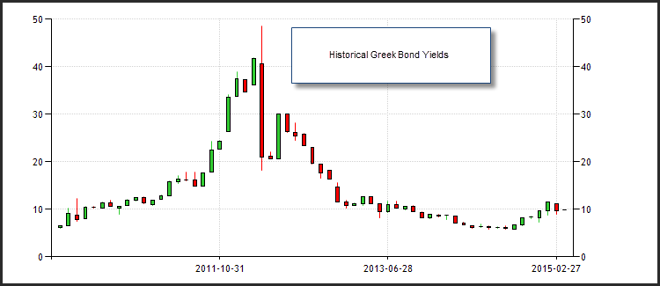Advertisement
Advertisement
Political Risk
Updated: Mar 5, 2019, 14:40 GMT+00:00
Intro
Political risks within the capital markets are the headwinds that create uncertainty and fear. Investors are often hesitant to enter new positions when
Political risks within the capital markets are the headwinds that create uncertainty and fear. Investors are often hesitant to enter new positions when they are uncertain of whether a systematic event can derail their positions. Political risks will generate unwanted volatility and directly and indirectly effect an investors short and long term returns.
The currency markets, along with equities and sovereign interest rates are the capital markets that are generally most affected by unfavorable changes to the political landscape. The most recent event that generates significant volatility was the European debt crisis that reared its ugly head during the summers of 2010 and 2011.
During this period, Greek bonds soared to their highest level on record to nearly 49%, as the Greek government refused to accept the terms the European Union bail out, which would allow the company to continue to function. Eventually Greece accepted the terms and previous investors were left with large losses. The event showed how politics in many European country could shake the large European Union as a whole.
Currency markets, are also very susceptible to political instability. A country can decide to devalue its currency when the government is in trouble, and they need to enhance their export capabilities.
In 1994 at the peak of political instability, the Mexican government decided to devalue the Peso against the US dollar. Mexico was experiencing significant political unrest and prior to the devaluation the Mexican government held a constant band against the US dollar which was defended by the Mexican government on a daily basis. Unfortunately, the political unrest created a break of the band generating significant capital market volatility.
Company’s investments in overseas emerging markets are vulnerable to political risks. These risks may occur without warning, and can occur from a number of sources in many different forms. Although governments of emerging markets are not as likely to directly penalize investors on purpose, they generally focus on the short term results which can lead to a devaluation of their asset base.
There have been situations throughout history in which a foreign government has purposely nationalized equity investments without remuneration to the investor. Cuba is a perfect example of this scenario. US companies lost billions of dollar when Cuba became a communist dictatorship.
Specific types of political risk can be mitigated using instruments such as credit default swap. For example, a re-insurer might generate a swap in which there is a specific notional payout if an event occurs. In the case where a government collapses or an assets is nationalized the investor looking for a hedge will be protected if an event occurs.
Political risk affects many financial securities such as currencies, stocks and debt products. Companies that have international exposure are subject to domestic and global political risk. There are a number of techniques an investor can use to hedge political risks, and these products are helpful in hedging an investor’s exposure to an uncertain political outcome.
Risk warning: Forward Rate Agreements, Options and CFDs (OTC Trading) are leveraged products that carry a substantial risk of loss up to your invested capital and may not be suitable for everyone. Please ensure that you understand fully the risks involved and do not invest money you cannot afford to lose. The information provided can under no circumstances be considered as a recommendation to engage in any trade. Our group of companies through its subsidiaries is licensed by the Cyprus Securities & Exchange Commission (Easy Forex Trading Ltd- CySEC, License Number 079/07), which has been passported in the European Union through the MiFID Directive and in Australia by ASIC (Easy Forex Pty Ltd -AFS license No. 246566).
About the Author
Advertisement
